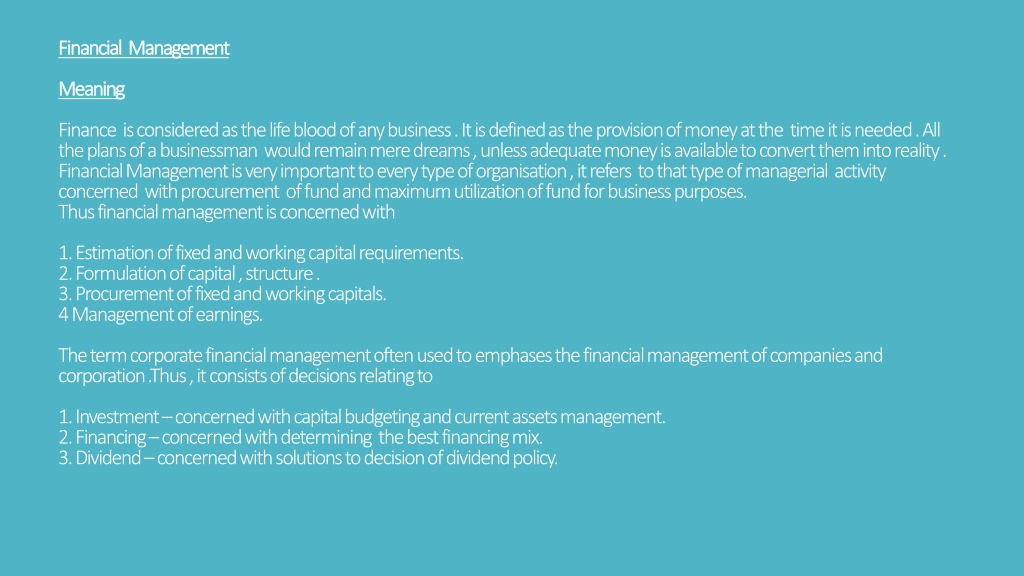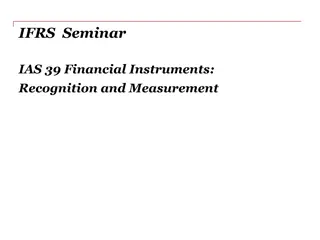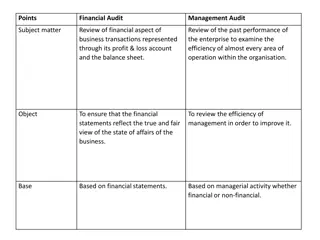Importance of Financial Management in Business
Finance is crucial for the success of any business, serving as the lifeblood that fuels operations. Financial management involves efficiently procuring and utilizing funds to achieve optimal business outcomes. Objectives include profit maximization, wealth maximization, increasing revenue, reducing costs, and evaluating different sources of funding.
Download Presentation

Please find below an Image/Link to download the presentation.
The content on the website is provided AS IS for your information and personal use only. It may not be sold, licensed, or shared on other websites without obtaining consent from the author. Download presentation by click this link. If you encounter any issues during the download, it is possible that the publisher has removed the file from their server.
E N D
Presentation Transcript
Financial Management Financial Management Meaning Meaning Finance is considered as the life blood of any business . It is defined as the provision of money at the time it is needed . All the plans of a businessman would remain mere dreams , unless adequate money is available to convert them into reality . Financial Management is very important to every type of organisation , it refers to that type of managerial activity concerned with procurement of fund and maximum utilization of fund for business purposes. Thus financial management is concerned with 1. Estimation of fixed and working capital requirements. 2. Formulation of capital , structure . 3. Procurement of fixed and working capitals. 4 Management of earnings. The term corporate financial management often used to emphases the financial management of companies and corporation .Thus , it consists of decisions relating to 1. Investment concerned with capital budgeting and current assets management. 2. Financing concerned with determining the best financing mix. 3. Dividend concerned with solutions to decision of dividend policy.
Objectives of Financial Management Objectives of Financial Management Financial management is concerned with efficient use of capital fund , evaluate how funds are procured and used . In all cases, financial management involves sound judgement , combined with logical approach to decision making. Different alternatives having different implications are available to a business organisation in the process of decision making . These alternatives have to be evaluated on the basis of the some analytical framework and commercial strategies of an organisation. There can be many financial objectives , two of them are notable because of the wide support for them . 1. Profit maximisation 2. Wealth maximisation Profit maximisation Profit maximisation It is maximising the rupee income of the business , although profit maximisation is traditionally considered as the main objective of the firm , it has been strongly attacked for not having logical managerial justification. Wealth maximisation Wealth maximisation It refers to the maximisation of the market price per share of the company . But the wealth maximisation is regarded as a betterobjective because it considers the 1. time value of money . 2. It takes into account the risk or uncertainty of future earnings. 3. It considers the effect of dividend policy in the market price of the shares .
The objectives of financial management are such that they should be beneficial to owners , management , employees and customers. These objectives can be accomplished only by maximising the value of the firm by following ways : -- 1. Increase in profit Increase in profit A firm / organisation can maximise its value through increasing its revenue . The revenue can be enhanced by way of stepping up the volume of sales or other activity . When a firm is in equilibrium position , its profit are said to be maximum at this stage .The average cost is maximum , and marginal revenue are equal . An increase of sales beyond this limit , will not necessary result in arise in profit unless markets are increased for increased supply and over head costs are controlled. 2. Reduction in cost Reduction in cost -- -- The firm should work by all means to reduce the cost of capital and to launch economy drive in its operation . 3. Sources of fund Sources of fund A firm can raise fund in various ways or source , the risk involved in all these sources are to be assessed before hand . While the issue of equity shares , increases the ownership funds of the organisation . The issue of debentures and preference shares enhances fixed and recurring obligation on it .
4. Minimum risk 4. Minimum risk No pain no gain is a common adage . Before embarking on any particular course of action , a firm will have to calculate different type of risk which it faces , the firm will have to consider the interest of equity share holders as the central focusof the financial policies while keeping the goal of maximising the wealth of the organisation or firm . 5. Long Run Value 5. Long Run Value The objective of financial management must maximise the long term value. The objective should be followed for the permanent progress and sound reputation of the firm.

















































